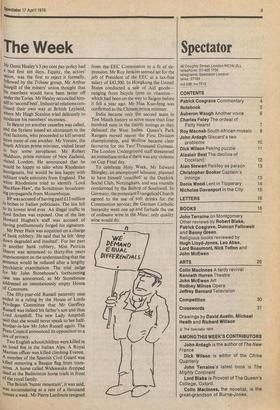The Week
Mr Denis Healey's 3 per cent pay policy had a bad first ten days. Equity, the actors' anion, was the first to reject it formally, followed by the Tribune group. Mr Arthur Seargill of the miners' union thought that his members would have been better off under the Tories. Mr Healey reconciled himself to 'second best'. Industrial relations continued their own way at British Leyland, Where Mr Hugh Scanlon tried delicately to Moderate his members' excessses.
In Beirut yet another ceasefire was called, and the Syrians issued an ultimatum to the rival factions, who proceeded to kill several score more of one another. Mr Vorster, the South African prime minister, visited Israel to buy some aeroplanes. Mr Robert Muldoon, prime minister of New Zealand, visited London. He announced that he would be happy to take white Rhodesian itnmigrants, but would be less happy with militant trade unionists from England. The White Rhodesians tried to identify 'Lord MacHaw-Haw', the Scotchman broadcasting propaganda from Mozambique.
BP was accused of having paid £13 million in bribes to Italian politicians. The lira fell to its lowest level ever. An illegal traffic in dYed finches was exposed. One of the late Howard Hughes's staff was accused of having posthumously forged his signature.
Mr Peter Hain was acquitted on a charge Of bank robbery. He said that he felt 'deep down degraded and insulted'. For her part in another bank robbery, Miss Patricia Hearst was sentenced to thirty-five years imprisonment on the understanding that the sentence would be reduced after a lengthy Psychiatric examination. The trial judge for Mr John Stonehouse's forthcoming ease was announced, as Mr Stonehouse addressed an ostentatiously empty House of Commons.
The fifty-year-old Russell paternity case ended in a ruling by the House of Lords Privileges Committee that Mr Geoffrey Russell was indeed his father's son and thus Lord Ampthill. The new Lady Ampthill said that she would never speak to her halfbrother-in-law Mr John Russell again. The Press Council announced its opposition to a law of privacy.
Two English schoolchildren were killed in an hotel fire in the Italian Alps. A Royal Marines officer was killed climbing Everest. A member of the Spanish Civil Guard was killed removing a Basque flag from tramwires. A horse called Wideawake dropped dead at the Badminton horse trials in front Of the royal family.
The British 'butter mountain', it was said, was accumulating at a rate of a thousand tonnes a week. Mr Pierre Lardinois resigned
from the EEC Commission in a fit of depression. Mr Roy Jenkins seemed set for the job of President of the EEC at a tax-free salary of £43,500. In Hongkong the United States conducted a sale of Aid goods— ranging from bicycle tyres to vitamins— which had been on the way to Saigon before it fell a year ago. Mr Hua Kuo-feng was confirmed as the Chinese prime minister.
India became only the second team in Test Match history to score more than four hundred runs in the fourth innings as they defeated the West Indies. Queen's Park Rangers moved nearer the First Division championship, and Wollow became clear favourite for the Two' Thousand Guineas. The London Underground staff threatened an immediate strike if there was any violence on Cup Final day.
To celebrate Holy Week, Mr Edward Shingley, an unemployed labourer, planned to have himself 'crucified' at the Dunkirk Social Club, Nottingham, and was roundly condemned by the Bishop of Southwell. In Germany, the protestant Evangelical Church agreed to the use of soft drinks for the Communion service; the German Catholic hierarchy went one up and forbade the use of ordinaire wine in the Mass: only quality wine would do.


































 Previous page
Previous page